Description
Al-Zaytouna Centre for Studies and Consultations in Beirut has published a new book entitled “The Suffering of the Palestinian Environment and Farmer under the Israeli Occupation.”
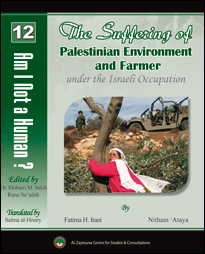 English
English
Title: The Suffering of Palestinian Environment and Farmer Under the Israeli Occupation
Prepared by: Fatima ‘Itani and Nitham ‘Ataya
Edited by: Prof. Dr. Mohsen Mohammad Saleh and Rana Sa‘adah
Published in: 2016 (1st Edition)
Paperback: 112 pages, 17*21 cm
Price: $4
The book is the 12th in the series “Am I Not A Human?” which endeavors to present a full and complete picture of the suffering of Palestinians under Israeli occupation. It tries its best to address the hearts and minds with the most accurate, concrete and documented framework, where citing different testimonies, images and graphs has bolstered the authors’ argument.
The 112 page-book, prepared by Fatima ‘Itani and Nitham ‘Ataya and edited by Prof. Dr. Mohsen Mohammad Saleh and Rana Sa‘adah, casts light on the suffering of the Palestinian farmer caused by the Israeli occupation. It also exposes the impact of the Israeli violations and practices on the Palestinian environment in general.
The book addresses the most important Palestinian and international laws and regulations related to the protection of the environment only to show how Israel ignores these laws and violates the minimal Palestinian environmental rights thus confiscating lands, destroying forests, uprooting trees and depleting water sources. The book explores the impact of Israeli settlements on the Palestinian environment, and the ways they contribute to its distortion through the manipulation of Palestinian natural resources and the infringement on all environmental elements.
The book displays the different forms of Israeli aggression on the Palestinian agriculture. These include confiscating lands, building settlements, opening roads, closing agricultural areas for military or security reasons, converting large areas of land into natural reserves that are later confiscated, controlling groundwater, and limiting the quantities that can be pumped for irrigation purposes, in addition to controlling the marketing of agricultural produce.
The book reveals the losses and the size of agricultural destruction during al-Aqsa Intifadah (Uprising), Operation Cast Lead (Al-Furqan) and Pillar of Defense (Stones of Baked Clay).
The book explores the impact of the Separation Wall on the Palestinian environment. It has shattered large agricultural areas, caused soil erosion, and the uprooting of lots of trees, in addition to the accumulation of dust on trees and agricultural lands resulting from the construction of the Wall, which affected their productivity negatively.
The book also addresses the issue of Israeli factories and their impact on the Palestinian environment. In this context, it talks about the pollution caused by chemical industries, and the production of toxics, like aluminum and lead, which are dumped into the settlements’ wastewater that is pumped into Palestinian agricultural lands.
It also talks about the pollution caused by the nuclear reactor in Dimona, and the environmental damage.
The book comprises seven chapters, the last of which addresses the spread of quarries, the theft of Palestinian soil and the consequent distortion of nature and its pollution.
This series is a rich interactive documentation of the Palestinian suffering under the Israeli occupation. It focuses on the Israeli violations of the Palestinians’ basic human rights. This series is also distinguished with academic, well documented, comprehensive, concise, and graphically-supported, It is published (& ongoing publication) in both Arabic and English Languages.



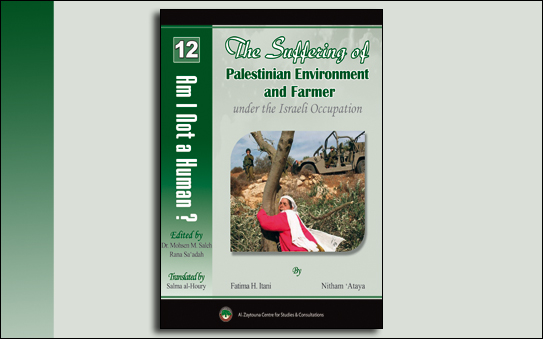
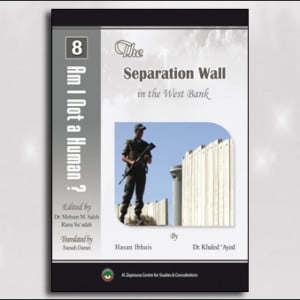
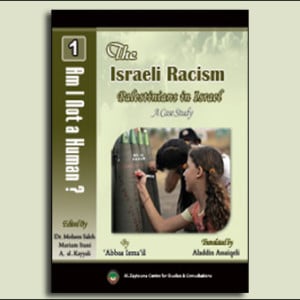
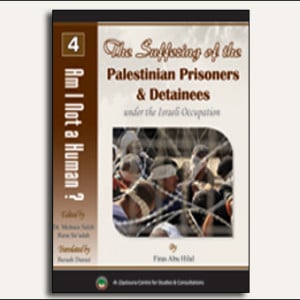
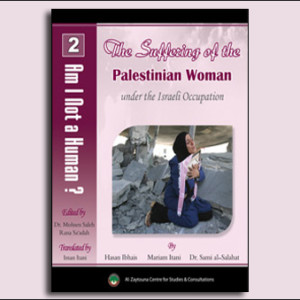
Reviews
There are no reviews yet.